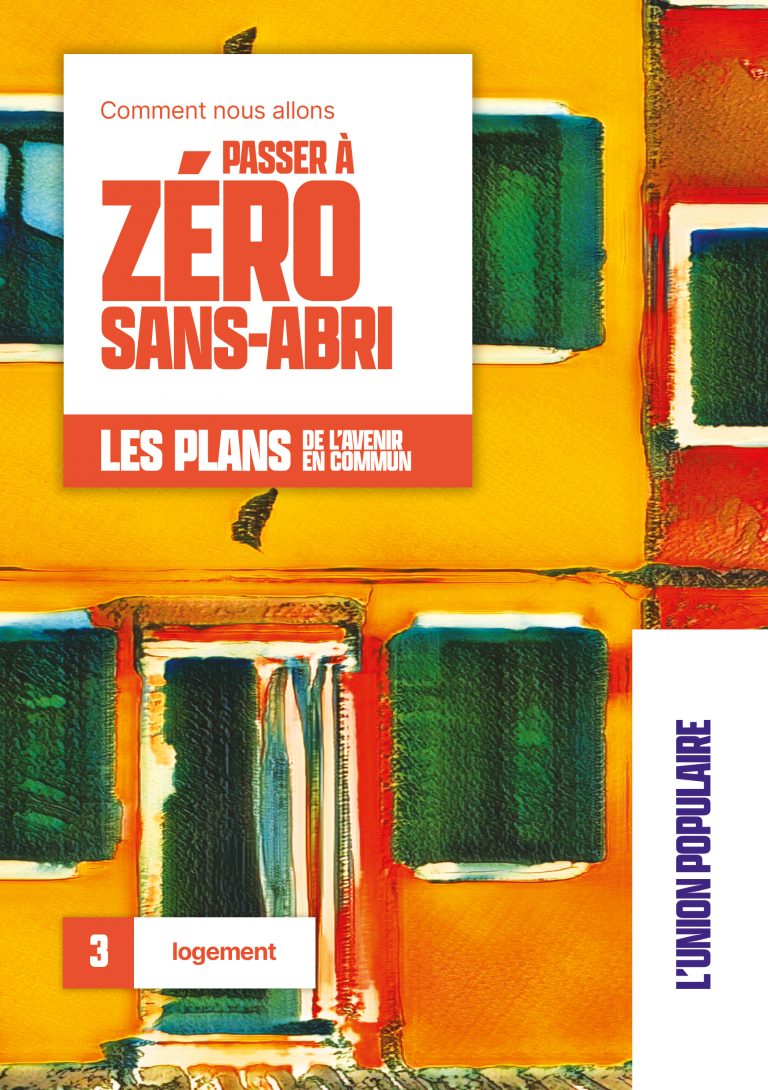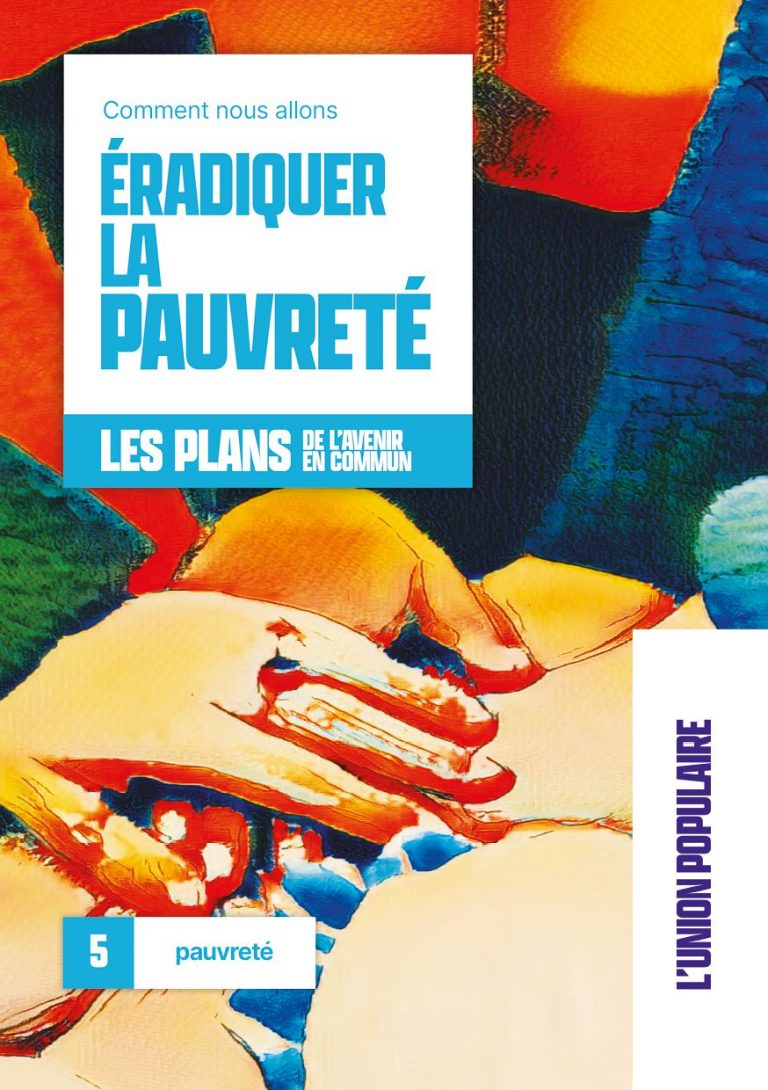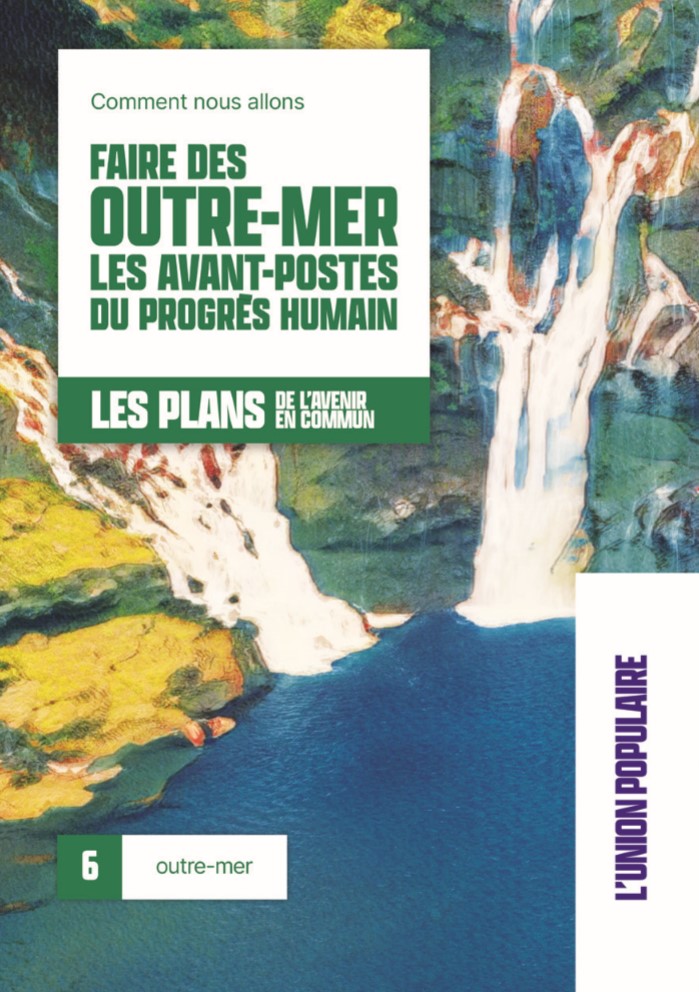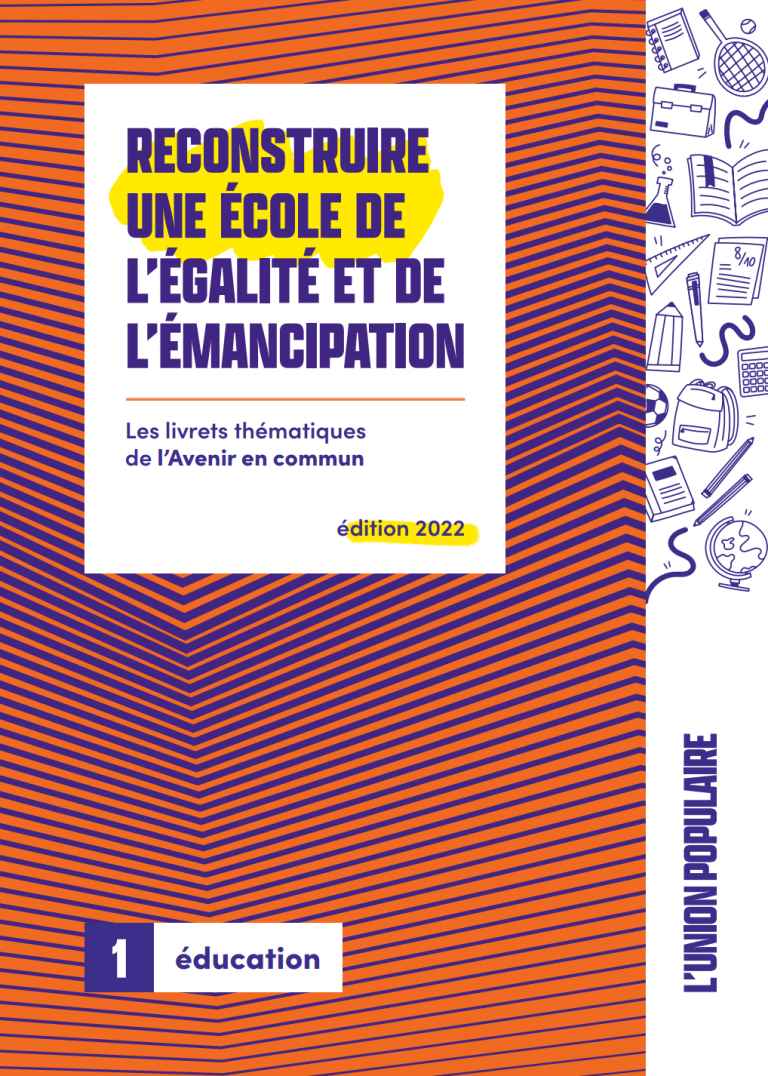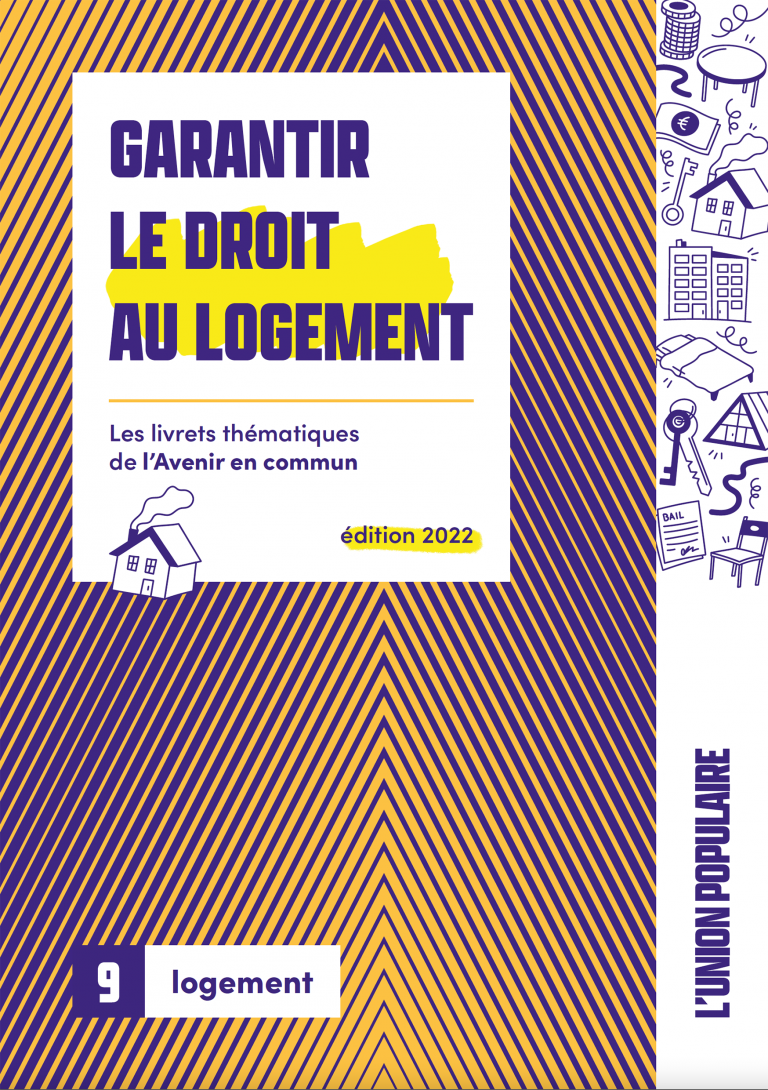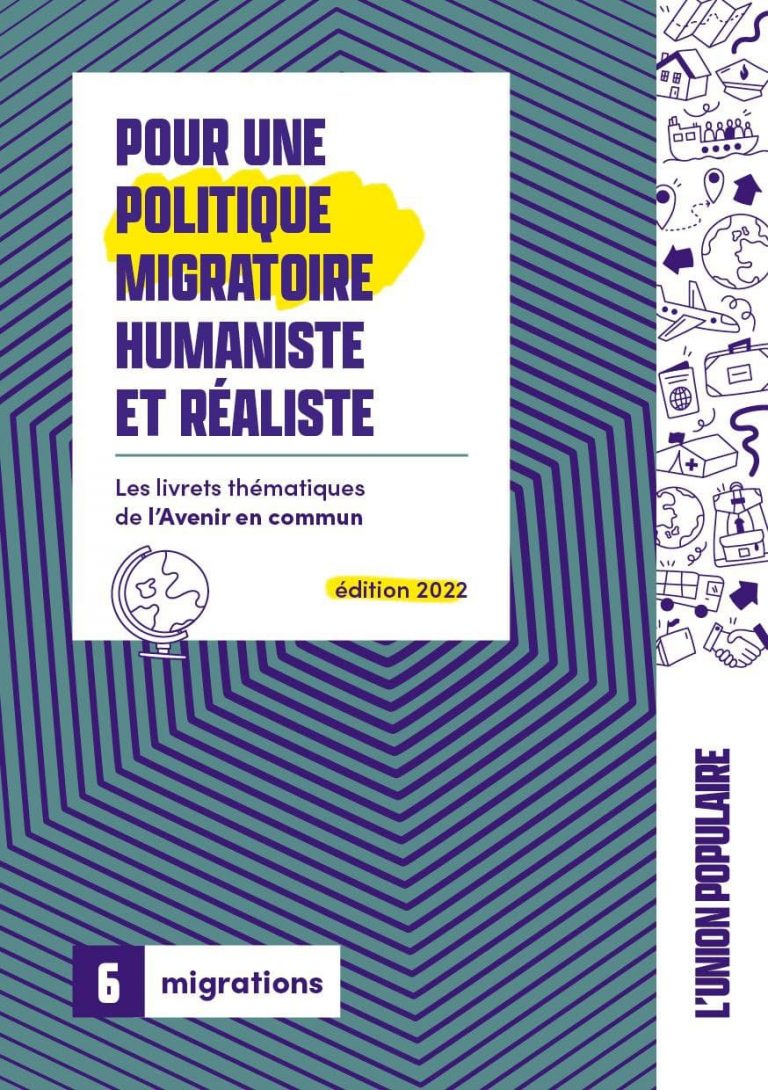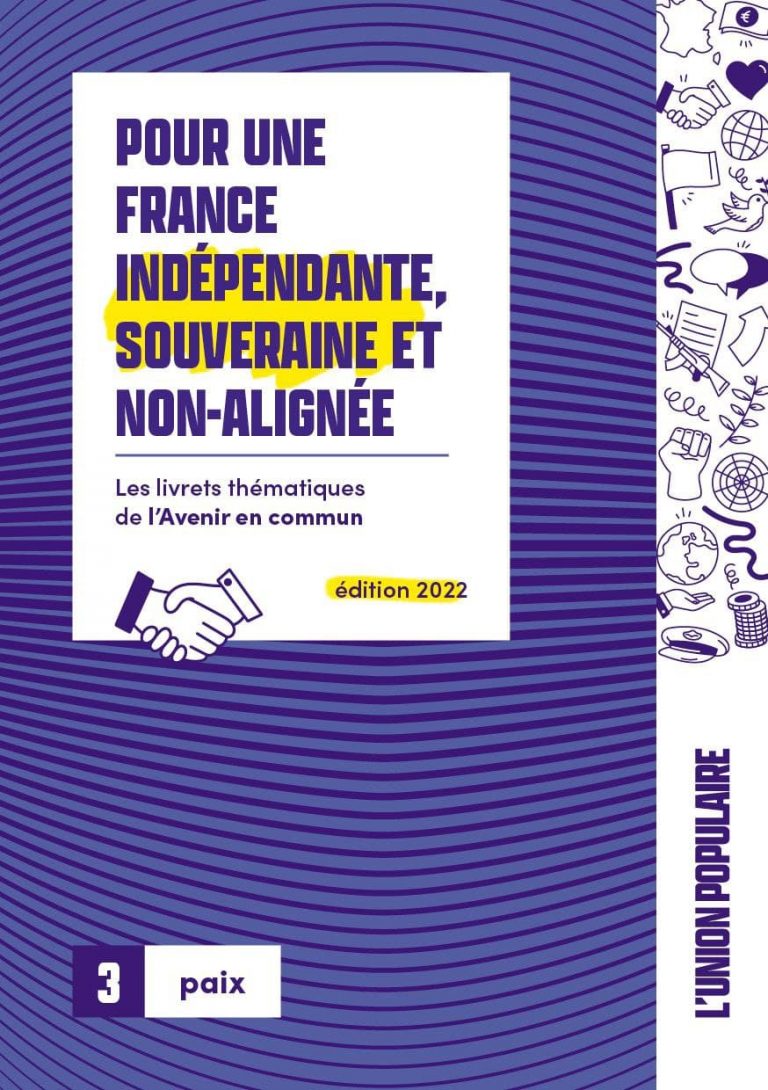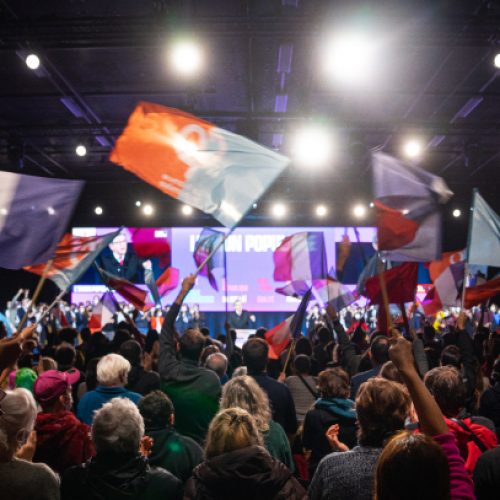INTRODUCTION
Who still believes in the promises of a social, ecological and democratic Europe heard at each presidential election?
Almost no one. Twenty years of cuts in public services and workers’ rights, massive pollution, the promotion of cut-throat competition and widespread privatisation have only opposed European institutions to the people on the continent.
The actual history of the European Union is one of deep disappointment and, since 2005, a usurpation of power. Since the original union of six member countries, the EU has changed its geography, political form and geopolitical direction many times, but a new step was taken in recent history. When two founding members said « No » in the 2005 referendum, before the answer was changed to « Yes » in France by an abuse of parliamentary authority, the European Union as we know it today turned into an illegitimate construction opposing the sovereignty of the French people.
The presidential election of 2022 is a call for us to seriously examine our relations with the European Union and our strategy. The aim is not to ask ourselves what Europe would look like in an ideal world. The practical aim is to make sure we can carry out a programme representing an ecological, democratic, economic and social break with the past in France, even if it means infringing European rules. We reject the abstract debate for or against Europe that Emmanuel Macron is seeking to impose on us. Of course, our historic tradition has always been based on internationalism, and of course we are in favour of international cooperation, whenever it improves living conditions and can help us tackle our shared challenges together! But we refuse to impose the shackles that the French people have rejected and which are obstacles to ecological and social progress.
So we are proposing another way forward: respecting popular sovereignty in Europe to the letter and imposing a principle of ecological and social non-regression in all circumstances. Our aim is simple: the very best in ecological and social progress. Our commitment is clear: to carry out our programme from start to finish.
To do so, our European strategy is based on a clear-headed analysis of the obstacles raised by European rules to applying our programme and on setting out a method to overcome them. It involves both influencing the balance of power and taking unilateral measures of disobedience.
The whole history of the European Union has seen shifts in the balance of power and flexible forms of cooperation: it is time for us to make use of them too so that we can carry out our programme. Failing to do so means condemning ourselves to the election-time lies and betrayals of previous governments.
Our opponents have understood this and have always identified the loopholes to get what they want. Now the French people can find a way to have its decisions respected, too, by giving a popular mandate to the aims in our programme « L’Avenir en commun » (« Shared Future »).
Developing a lucid analysis of the European Union’s situation
The catastrophic results of Macron’s five-year term in Europe
Emmanuel Macron dreams of being a champion of Europe, but his results in Europe are catastrophic. He has given way on everything: to the penny-pinching obsessions of northern Europe and to the authoritarian tendences of the governments in the east. His big speeches on the climate and inequalities have never been translated into action. His government has been compromised in shameful alliances and scuppered the few measures of human and ecological progress. And his conference on the future of Europe, a “big debate” supposedly aimed at reconciling the peoples of Europe with the European Union, is both a farce and a democratic flop.
Macron has given way on everything
- He gave way when faced with the penny-pinching states: he agreed to them getting a rebate of 53 billion euros over 7 years on their contribution to the Union’s budget.
- He approved a tiny stimulus plan, three times smaller than the one demanded by the European Parliament, and consisting mainly of loans.
- He legitimised the golden rule of the 3 % deficit which he claimed he wanted to reform[1], by accepting that the « stimulus » funds would depend on structural reforms based on cuts.
- He gave way to the authoritarian states by agreeing to undermine mechanisms for respecting the rule of law, which were supposed to guarantee that basic freedoms and fundamental democratic principles should not be attacked[2].
- He maintained the posted workers directive, and therefore social dumping, despite his promises. He has even made the situation worse: since 2018, allowances for accommodation, meals and transport have depended on the workers’ home country!
- He has accepted negotiations on new free-trade agreements[3] under pressure from Germany, in particular, while promising to relocate strategic sectors[4].
- He took part in the conference on the future of Europe, but this was always going to be a pure exercise in communication without the clear aim of revising the European treaties[5].
Macron has fought behind the scenes for something worse
- He fought hand in hand with big business to undermine an ambitious directive concerning tax transparency on multinationals[6].
- He has sought to block European-wide parental leave, which he describes as « a nice idea that might turn out to be very expensive and unsustainable »[7].
- He has allied with the far-right Viktor Orbán in Hungary[8] and the authoritarian government in the Czech Republic to promote gas and nuclear power as green energies in the European taxonomy (the future European environmentally sustainable activities label)[9].
- He has made the Dutch prime minister, Mark Rutte, his number-one ally in the European Council, although Rutte runs one of the worst tax havens in Europe and wants to impose austerity on the rest of the continent[10].
- He has posed as a champion of the land but has respected none of the ecological goals set by the European Union concerning the climate, air pollution[11] or the preservation of biodiversity.
- He has shrouded in darkness contracts signed with pharmaceutical laboratories during the health crisis and refused to support an international campaign for a vaccine patent waiver.
- He has tried to subvert a proposed directive imposing presumption of employee status for online platform workers, which went before the European Commission on 9 December last year. He is planning to use the French presidency of the Council of the European Union to put a brake on the directive, thus combating one of the few social breakthroughs put forward by the EU.
The 2022 context is the chance for a French government to make a break with the past
In 2022, the European Union will be at the crossroads
- France will be occupying the rotating presidency of the EU Council from January to June 2022. The newly elected French president will be able to dictate the European political agenda, a situation that occurs only once every 14 years. So we will set up a major European summit as soon as we take power.
- In 2022, Europe will have to decide whether rules that were temporarily suspended during the health crisis will be re-established, regarding both budgetary control and the system of government support to businesses.
- Europe will have to choose between speeding up or halting the process of Balkan countries’ accession to the European Union and continuing EU expansion without prior social harmonisation.
- The conference on the future of Europe called by Emmanuel Macron will probably not lead to a significant change in European treaties, even though changes are widely supported by Europeans.
European institutions are more fragile than ever
- The European Council (consisting of the heads of European member states) is divided and will be poorly placed to unite against a newly elected popular government in France:
- Merkel’s reign has come to an end, and her replacement Olaf Scholz will be weakened by the internal contradictions in his coalition government.
- The countries of southern Europe will not accept a repeat of the European response to the financial crisis in 2008, where the obsession with austerity plunged whole countries into a terrible situation.
- The reactionary far right is destabilising European institutions, and the attacks on basic freedoms and the on the rule of law in Hungary and Poland are a focal point for tensions.
The European Commission is weaker than ever:
Its president Ursula Von der Leyen is the most narrowly elected president ever, with a very small majority (383 votes, just 9 more than the minimum required).
She has been incapable of coordinating the European states’ responses to the health crisis or to impose her terms in contracts signed with laboratories.
Her clumsy and ill-managed attempts to exist in geopolitics have weakened her on several occasions abroad, as when faced with Erdogan or Putin.
Her powerlessness when Hungary and Poland were undermining the rule of law have only boosted authoritarian far-right governments.
The purely market-based European ideology is a failure and is widely criticised
European industry under threat:
- Free trade has led to catastrophic deindustrialisation: Europe is not even able to produce basic health equipment (masks, tests, etc.) or vaccines.
The European system has failed on climate change:
- Free and unrestricted competition and the reign of the market at any cost have proved totally incapable of reorienting our production model. As a result, the European Union is not meeting its climate goals, even though they are well below the recommendations set by the IPPC.
The welfare state under attack:
- The disastrous consequences of austerity are seen in health systems that have been overwhelmed by the pandemic, and social safety nets have been unable to cope with the crisis.
- The pursuit of fiscal dumping has led to widespread tax evasion scandals and a levelling down of taxation, contradicting a return to higher taxes on the wealthiest individuals and multinationals in some English-speaking countries and an international drive to minimise taxation on companies.
- Heightened competition between workers in the European Union has resulted in offshoring practices and downward pressure on wages, and has been used as a support for wide-ranging offensives against social rights everywhere in Europe.
European law will set up a range of obstacles to applying the « L’Avenir en commun » programme
We are strongly committed to fully implementing the programme approved by the French people if we win the presidential election. This will involve clashes with European institutions, since carrying out some of these measures will fall foul of European law (treaties, directives or regulations). Our European strategy will be based on a serious and lucid examination of these obstacles.
So we have carefully scrutinised the « L’Avenir en commun » programme in the light of European law and identified the main sources of incompatibility:
- The free-trade treaties are opposed to environmental protectionism.
- Free and unrestricted competition prevents new public sectors from being set up and the national ownership of public goods: for example, European law forbids the renationalisation of freight transport or dams and outlaws preference for local and organic production in public procurement contracts.
- The budgetary straitjacket and especially its main rule of the 3% deficit restricts us to austerity and reduces our capacity to invest in an environmental and social orientation.
- The free movement of capital prevents us from taking power away from the financial sector.
- The Common Agricultural Policy promotes a model opposing small-scale and organic farming or the respect for animal welfare.
- The lack of social harmonisation and the posted workers directive force workers into competition and contradicts the principle of « equal work, equal wage ».
- The lack of harmonisation in taxation protects tax havens and is a threat to our tax revenues and to citizens’ willingness to pay taxes.
- The common defence policy restricts us to following NATO’s orientation towards war.
- The status of the European Central Bank (ECB) forces us to put the State in the hands of the financial markets if we want to find funds.
Implementing an ambitious environmental programme is incompatible with current EU rules
The European Union proclaims (at least in words) far-reaching ambitions on the climate. And yet many of the measures required in the face of the environmental emergency, especially those promoted by the Citizens Convention for Climate, are impossible to achieve due to the European obsession with liberalisation and competition.
Develop sustainable transport? But the public transport networks have been dismantled, privatised or turned into commodities to meet European requirements on competition. As a result, the State has lost its capacity to develop a public transport network.
Adopt 100% renewable energies and reduce energy bills for the less well-off? The privatisations and liberalisation of EDF and Engie (ex-GDF) have taken away our control over energy sources, and the promotion of competition between energy suppliers has led to rises in prices of at least 60 %. The European energy market promoted by the Commission and supported by Macron is boosting the logic of speculation, preventing us from developing a real energy plan to protect the climate and citizens.
Develop organic and local canteens, and environmentally friendly accommodation? But our public markets have also been subjected to competition on a European level, so that it is less and less possible for ecological criteria to outweigh price criteria. This leads to a preference being given to polluting companies and to products from the other end of the European Union.
Adapt VAT rates according to the distance travelled by imported products? The European Union rejects this measure in the name of free and unrestricted competition. In short, any serious environmental plan has to take these obstacles into account and to develop a strategy for overcoming them. Respecting the current European rules to the letter means accepting to remain powerless on climate and biodiversity issues.
Our strategy for overcoming European obstacles
Based on this analysis of the incompatibilities between our programme and EU law, our European strategy aims to overcome these obstacles, issue by issue, through a governmental method founded on respecting the people’s choices.
We propose to European states and peoples to make a concerted break with current European treaties (plan A).
This will involve negotiating new European rules that are compatible with the climate and social emergencies and which will be submitted to the French people for approval in a referendum. In particular, we aim to:
- restore state sovereignty over budgets
- change the status of the European Central Bank
- implement rules of social and environmental harmonisation within the EU
- introduce environmental protectionism
- the right of states to come to the assistance of companies or to set up public monopolies in strategic sectors
- the right to water as a basic right for all Europeans
In all cases we will apply our programme immediately on a national level, accepting a confrontation with European institutions (plan B).
- To do so, we will use all possible levers in support of our position within the European Council.
- We will disobey the rules obstructing our policies whenever necessary.
These two strategies are mutually beneficial: by acting as an avant-garde, we can lead the other European peoples forward!
Our approach is simple. As long as no agreement has been made to change the treaties, we will hold talks with our partners while disobeying any rules obstructing our policies. In the event of such an agreement, it will be subject to a referendum.
Stating our case: for a Europe working on behalf of people!
With our allies on the left in the European parliament, at all times we promote a shared vision and combat in Europe. The following ten priorities set our political goal in order to radically reorient both the European Union’s aims and the way it works. In particular, they include measures requiring a revision of the treaties which we will put forward during negotiations at a major European summit to be organised as soon as we take power and within the framework of the French presidency of the European Union.
Our ten priorities for Europe!
Make the struggle against climate change, the loss of biodiversity and social inequality a priority: make social justice and the respect for worldwide limits truly European Union values, set a goal of reducing greenhouse gas emissions by at least 65% by 2030, set up new, clean, sustainable and fair resources to finance investments of public interest and adapt the Common Agricultural Policy to serve a model of small-scale farming, respecting living things.
Put an end to the shackles represented by austerity and European monetary policy: abolish the rules of budgetary austerity with a 3 % deficit and 60 % debt, allow the ECB to lend directly to member states and to finance sustainable activities only, and cancel the Covid debt to enable member states to make massive investments in an environmental and social reorientation.
Expand social rights: to put a stop to the unequal treatment of posted workers, guarantee basic European social rights and to establish a framework for European minimum wages in order to fight social dumping and improve working conditions, and impose the presumption of employee status for online platform workers, in order to prevent the uberisation of the world of work through the fraudulent use of independent worker status.
Eradicate tax evasion: guarantee total fiscal transparency from multinationals, introduce a minimum taxation rate on companies and impose penalties against European tax havens and tax evaders in order to put a stop to tax competition within the EU.
Put an end to total market control: revise European competition law to help public bodies to develop and to take charge of all services of general interest, guarantee the protection of public goods by taking them out of market control and give the social and solidarity economy precedence in public procurement contracts.
Introduce social and environmental protectionism: move from a free-trade approach to protection of solidarity in line with the Paris agreements, the conventions of the International Labour Organization and international law, reject any new agreement failing to respect these principles and introduce social and environmental customs duties at Europe’s borders to protect our industry, workers and the environment from international social dumping.
Welcome migrants with dignity: put an end to the Dublin regulations, so that we can coordinate the arrival of migrants among member states, guarantee respect for the rights of exiles and international commitments regarding asylum, put a stop to the militarisation of borders carried out by the Frontex agency and develop a sea-rescue organisation.
Promote peace: say no to a European defence policy linked to NATO, which is part of a US strategy of raising tensions worldwide, defend the multilateral framework of the UN, support and defend the Treaty on the Non-Proliferation of Nuclear Weapons, put a stop to exports of weapons to oppressive regimes, support forums for diplomatic regional and international dialogue.
Achieve equality: apply the clause of “the most favoured European woman” to harmonise the rights of women in Europe in an upward direction, make the right to abortion and all other sexual and reproductive rights part of the Charter of Fundamental Rights of the European Union and bring to fruition the project for a global and universal EU directive against all discrimination, to combat all forms of racism and discrimination linked to origins, gender, disability, sexual orientation or gender identity.
Reinforce democracy: suspend European funding to member states failing to respect the rule of law or basic freedoms, give national members of parliament a bigger role in EU decision-making, strictly control lobbies, reinforce the role of MEPs by introducing a right to launch initiatives in the European Parliament and re-examine the way power is shared out among European institutions to make them more democratic and transparent, and introduce new forms of participation, such as a compulsory European Citizens’ Initiative (a referendum launched by European citizens) and a permanent citizens’ consultative body.
Accept the necessary confrontation with the European institutions by making use of two tools: the balance of power and disobedience
We accept the prospect of destabilising the Brussels machinery and entering into conflict with it. For 60 years now, the European Union has not been a fixed or stable construction: it is a political area founded on the balance of power and widely varying forms of cooperation. It has only been built and developed in contexts of crisis and through the balance of power between states. This time, we will use all the influence of France to carry out our programme. Conflict is inherent in European decision-making and our opponents are never shy of using it.
This strategy of confrontation is based on two pillars that must be used at the same time: the balance of power within the European Council and disobedience to the rules that prevent our programme from being applied.
Influence the balance of power
France is far from being powerless – we will make use of all our means of action to influence the European Council:
- Using France’s right of veto, for example, to reject any new agreement on free trade and membership of any new members without social, fiscal and environmental harmonisation being agreed beforehand. These decisions cannot be taken without France’s agreement. We just need to hold firm!
- Condition the payment of the surplus paid by France to the EU budget (which was 28.8 billion euros in 2021, or 18% of the total contributions from the member states)[12]. France is a net contributor to the EU (we give more to the European Union budget than we receive): this is a crucial tool in the balance of power!
- Develop new, deeper cooperation with willing states in social, environmental, cultural, educational and scientific fields, among others. (in a similar way to programmes like Erasmus or industrial partnerships such as Airbus).
- Encourage the mobilisation of citizens alongside our political allies and civil society in Europe to boost the legitimacy of our outlook (taking support in particular from the dynamism of the climate-change movements and the petitions linked to European citizens’ initiatives).
Along with these main levers are added other, shorter-term tools that will help us maintain pressure on European institutions: the use of blocking minorities for legislation, constructive abstention, boycott of bodies or meetings alone or with others, refusal to approve nominations to key positions.
Our opponents never shy away from accepting conflict to get their way!
Free-market, right-wing and far-right European governments are the first ones to confront the European Union when a decision in not to their liking. Or even to make use of blackmail to get what they want, forcing others to give way or obstructing a development they disapprove of.
- De Gaulle always made use of the Empty Chair to maintain the principle of unanimous voting on the most important decisions and in this way achieved the « Luxembourg compromise ».
- Since Thatcher’s “I want my money back”, the UK Conservatives have been given several exemptions after diplomatic power plays (rebates, working time, police cooperation, etc.).
- The Netherlands, Denmark, Sweden, Austria and Germany threatened to obstruct the European stimulus package in order to maintain or even increase their rebates (7.6 billion euros each year in total) on their contribution to the European Union budget.
- Poland and Hungary have done likewise to undermine the criterion of respect for the rule of law in the context of obtaining European subsidies.
- The United Kingdom, Poland, Hungary, Slovakia and the Czech Republic formed a coalition to delay adoption of a revision of the posted workers directive through a blocking minority within the Council.
For years now, European tax havens such as Ireland, Luxembourg and Malta have been obstructing the project to harmonise company taxation in Europe by threatening
Act alone or alongside others?
We always prefer group action. France can, for example, mobilise the alliance of southern European countries in the EuroMed 7 club (France, Italy, Spain, Portugal, Greece, Cyprus and Malta) set up to face the league of frugal countries which are seeking to quickly restore the rules of austerity that had been put on hold and to enforce them all over Europe.
But we are also willing to act alone if necessary. France has a specific demographic, economic (2nd biggest European economy), diplomatic and historic weight within the European Union: it is time to put it to work and launch the environmental and social reorientation we need! And always with the same line of conduct: respecting the electors’ democratic choice and implementing our programme. In this way, we will be able both to create room for manoeuvre nationally and trigger bigger changes on a Europe-wide scale. This will not lead to France’s isolation. On the contrary, it will put us back at the heart of European diplomacy.
The European Union has always involved cooperation at varying speeds
The European Union is not at all about « take it or leave it » but is a variable framework providing room for manoeuvre to countries willing to grasp it. This shows that it is possible for certain member states to adapt the European rules to popular national decisions.
- Ireland has refused to be a member of the Schengen Area. On the other hand, non-member states such as Iceland, Liechtenstein, Norway and Switzerland have all joined[13].
- Denmark and Sweden refused to adopt the euro[14]. And Denmark plays no part in the common foreign and security policy[15].
- Due to deadlocks arising among the 27 members, states have opted to negotiate individually and to develop closer cooperation: a coalition of 11 states is working on a tax on financial transactions[16]. 14 member states have decided to adopt a text on international divorces to get around the Swedish veto[17].
- On the other hand, cooperation also goes beyond the framework of the 27 member states: in the industrial sector for Airbus and MBDA or diplomatic partnerships, such as the Council of Europe[18] and the Union for the Mediterranean[19]. Due to the 2008 financial crisis, the European Union modified the Treaty of Lisbon in the space of an evening and set up intergovernmental mechanisms outside European law to avoid a series of bankruptcies in the banking sector[20].
France can obstruct the signature of new free-trade agreements!
Despite grand speeches about « relocalisation » and « European protectionism », the Commission is stubbornly promoting free trade more than ever. Trade agreements are in force with 77 countries, 24 new agreements are in the process of being adopted and 5 are currently being negotiated!
Yet this is insanity in terms of the environment (we are continuing the great relocation of the world) and of human rights (we are encouraging social dumping and the exploitation of workers in catastrophic conditions). Opposition to free-trade agreements is in fact growing stronger everywhere. Over 2,000 European local authorities have declared themselves outside TAFTA or CETA. Over 3 million people from 14 countries have signed the European Citizens’ Initiative against these agreements.
So our commitment is clear: no new free-trade agreement detrimental to the planet or human rights will be implemented while we are in power. And as luck would have it, this is possible!
Since Wallonia managed to prevent the signature of the Comprehensive Economic and Trade Agreement (CETA) with Canada in 2016, the European Commission has separated the « simple » parts of free-trade agreements from « mixed » parts (as, for example, for the agreement with Vietnam).
- For the so-called « mixed » agreements (the majority of agreements), which encroach on the competences reserved to members states according to the European treaties, the member states must approve the signing of the agreement unanimously. So each government has a right of veto and can refuse to ratify an agreement! This is what the Citizens Convention for Climate asked Macron to do for the CETA, but he refused. This is what we will do systematically.
- For « simple » agreements (less common), concerning the competence of the European Union alone, a qualified majority is in theory required to reject an agreement, which is far from impossible with the support of civil society!
In both cases, we will have the means to oppose them. For the agreements currently being adopted, we will demand systematic application of suspension clauses in the event of infringements to human rights or to the environment by the signatory countries.
Disobedience when necessary in carrying out our programme!
Disobedience is not a political goal in itself. But we will have no hesitation to disobey when necessary, even if we initially have to act alone. We will act as an avant-garde, leading other states forward in obtaining exemptions for a handful of them or towards a general breakthrough for all 27 countries.
Disobedience can take varied forms:
- Unilaterally ceasing to apply norms that are incompatible with our environmental and social commitments, such as the directive on posted workers, the budget rules, competition rules and the free movement of capital
- Opting out of French participation in certain programmes, such as the European defence policy, subordinated to NATO
- Making use of the contradictions between Europe’s rules and our international commitments about the climate or work to give precedence to the strictest standards
- Reaffirming the superiority of the basic principles set out in the Constitution of the 6th Republic regarding European law and establishing a principle of environmental and social non-regression: no European standard can be applied if it is less ambitious than a national standard pertaining to social or environmental issues
France can decide to pull out from certain programmes unilaterally
A number of countries have been allowed to opt-out of European policies. As a result, these measures have never applied to them!
- States have negotiated the chance to opt out when a treaty is signed: in areas where a unanimous decision is required from states, the possibility of opting out was agreed to avoid a deadlock. In this way, Ireland[21] opted out of the Schengen Area, and Denmark is not required to take part in the Common Security and Defence Policy[22] or in the euro[23].
- The possibility of opting out even though a treaty has already been signed: this is the case of Sweden, which had committed to joining the European Exchange Rate Mechanism as part of the euro, but later had to give up the idea after a referendum[24]. To prevent a deadlock in the entire process, the European Commission and Central Bank preferred to give the Swedes a “de facto” opt-out.
So France could unilaterally withdraw from programmes it does not wish to take part in (such as the European defence policy).
Disobedience is necessary and legal!
Some European rules are opposed to international norms to which France is committed, as well as to some national norms. For this reason, we could disobey these rules, while respecting the same principle: to let the most ambitious social, environmental and democratic rights take precedence.
- The European treaties and resulting law are only one of the many international obligations France has agreed to: there is no reason why they should be seen as more important than following international agreements on social protection or the climate. The French Constitution, through article 55, does not place international and European commitments in a hierarchy. So we could stop applying the posted workers directive, which contradicts the International Labour Organization’s (ILO) Convention 97 on migrant workers. France can also leave the carbon emission trading system, which is incompatible with the aims of the Paris Agreement on the climate.
- The European Union is also obliged by the treaties to respect the constitutional identity of member states. Article 2 of the Treaty on European Union (TEU) states that » The Union shall respect the equality of Member States before the Treaties as well as their national identities, inherent in their fundamental structures, political and constitutional, inclusive of regional and local self-government. ». In the past, the Public Prosecutor of the Court of Justice of the European Union (CJEU) recognised the capacity for national authorities to define specific national conditions that could justify « differing treatment ».
In Germany, the Court of Karlsruhe had no hesitation in challenging European law, basing itself on the Basic Law of Germany. For the past 15 years and once again recently[25], the French Constitutional Council has also underlined its power to bypass European law when it contradicts the rules and principles inherent in the French constitutional identity. In a decision on 15 October 2021, the Constitutional Council itself highlighted constitutional identity when giving precedence to a French standard over a European standard, namely the illegality of delegating the use of public force to private individuals[26]. The French government will have no hesitation in doing likewise by invoking the introduction to the Constitution of 1946 to set up public bodies and to remove vital sectors, such as energy, from the European approach of openness to competition. The 1946 introduction is still applied today and states that « all property and all enterprises that have or that may acquire the character of a public service or de facto monopoly shall become the property of society ».
- Creating a principle against environmental and social regression in the 6th Republic to prevent European rules from undermining the rights of French citizens. The meeting of a constituent assembly with the role of drawing up a constitution for the 6th Republic will be a chance to reorient the relations between the French state and the European institutions. By adopting a new constitution, the French people will be able to assert clearly that for France, protecting basic social and environmental rights takes precedence over the law in Brussels when the latter is less ambitious.
Through disobedience we can influence others!
Disobedience is a way to create precedents forcing European institutions to authorise specific exemptions or statuses, and even to broaden these measures to all the member states.
- Germany refused to open drinking water and hydro-electric production to competition and thus obtained exemption from competition for the drinking water sector in a directive[27].
- European mobilisation opposing genetically modified (GM) organisms and resistance from a number of member states forced the European Union to revise its directive authorising states to restrict or ban GM crops in their countries (although they are still authorised in the European Union as a whole).
- France banned titanium dioxide as a food additive in 2019, even though it was still authorised by the European Union. In 2021, the European Union finally followed France’s lead and decided to ban titanium dioxide everywhere in the Europe[28].
- Instead of giving pride of place to competition, in 1981 France decided to adopt a law for a fixed price for books as part of its cultural policy. A specific policy that was later taken up by other countries, forcing the European institutions to legalise this price-control mechanism[29].
- France has also imposed its interventionist cultural policy on the European Union, with quotas for broadcasting and distributing works in the French language and special taxes on the cultural industry to be paid as state grants to promote cultural diversity. A policy that was taken up on a Europe-wide level in 1993 with the creation of a special status for European works in the audio-visual sector, with the aim of protecting… free trade[30]!
Our opponents were the first to disobey
Disobedience is taboo in the French political debate, but in fact it is widespread in a large number of members states, particularly among our free-market or far-right opponents.
Often to the detriment of human, environmental and social rights…
- Poland and Hungary have undermined the rights of LGBTI people and exiles, and have attacked the independent judiciary.
- Italy does not follow European standards on drinking water.
- Germany has failed to achieve European requirements for air quality.
- Hungary does not respect the European rules for urban wastewater treatment.
And Macron is no laggard when it comes to disobeying when it suits him!
- For the European standards on air quality, despite legal decisions.
- For the directive on working time, which he refuses to apply to the armed forces.
- For the requirements on data protection, which he has ignored while continuing the widespread conservation of network data under the pretext of combating terrorism.
- For the obligation of regular safety inspections for two-wheelers, for which he has suspended the application that was scheduled to take place in 2023.
- For banning some « non selective » hunting activities, such as using bird lime!
… As well as avoiding acceptance of the economic straitjacket they have themselves created and promoted!
Free marketeers fight tooth and nail for the ridiculous economic straitjacket imposed on state members as part of the European Semester. And in particular the arbitrary golden rule of 3% of the deficit, plucked out of the air without anyone being able to justify its economic rationale.
Competition, austerity, state aid: many of the dangerous rules preventing members states from taking action have been suspended during the health crisis. But many liberal governments are disobeying it already!
- In the space of 20 years, the « golden rule » of a 3 % public deficit public has been broken 171 times, including 7 times by Germany, without any penalty being inflicted.
- Germany was given approval for state aid of 200 million euros to modernise its rail freight network since it is « beneficial to the environment » as well as « well adapted and necessary », and an aid of 500 million euros to finance energy efficiency in transport.
- For years and without ever being fined, the Netherlands and Germany have infringed the rules applied to the trade surplus (which is supposed never to go over 6% of GDP for any length of time) to avoid high levels of imbalance between member states.
During the sovereign debt crisis, European states signed an intergovernmental treaty in parallel to the EU in order to create a mechanism to bail out the banks while avoiding a legal deadlock.
We are ready to implement this strategy
Our strategy is credible and realistic. We have foreseen the possible reactions of the financial sector and of European institutions and are ready to respond.
Resisting pressure from the financial system
The financial sector does not work in favour of the real economy. On the contrary, its activities are more and more linked to speculation, including in its dealings with states, as was shown in the attacks carried out on Greece in 2008 and against Italy in 2020. Implementing a political programme that is hostile to the interests of finance and marking a break with the European economic framework could lead to attempts to influence the balance of forces by the markets or the rating agencies.
We have the levers to defend our financial capacities
In the face of France’s capacity to borrow being endangered, we will take unilateral measures to continue to finance our programme:
- A citizens’ audit of the public debt and its cost to society will be undertaken: this will help us target the illegitimate part of our debt, assess the cost of public aid to banks and the impact of their activities on society and the environment, while preparing to take back control of our debt and the banking sector.
- Control the movements of capital and finance: we need to submit financial operations to strict regulations and to ban speculative practices, tax the flow of capital and protect France’s financial stability, including by being ready to seize financial institutions infringing the security of the financial system or acting deliberately against the state.
- Set up a public banking sector: we need to socialise mainstream banks and create a public banking sector to finance the real economy. This public banking sector could be a main purchaser of French public debt.
- Grant a banking licence to the Public Investment Bank: this would mean it could find funding from the European Central Bank. In this way, we will have an extra lever to finance major investment projects without having to use state debt.
- Create a new treasury process to force banks to direct part of the private savings they collect towards state financing
The European Central Bank is forced more and more to intervene to protect member states against the markets
We have reached such a high level of economic interdependence that the European Central Bank (ECB) now has to defend the member states’ interest rates on the markets, even if this means disobeying EU treaties! In principle, the treaties forbid the ECB from financing states. But as a result of successive crises, the ECB has been forced to overlook this principle.
- In 2010, the ECB began buying up State debts[31] to prevent a crisis for the euro.
- In 2015, the ECB launched a new programme to buy up both public and private debt, to see off the risk of inflation in the eurozone. The ECB has never been able to stop these programmes due to the risk of destabilising the eurozone. Today, the ECB is buying up tens of billions of public debt each month.
- In 2020, due to the pandemic, the ECB was forced to buy up the debt of the states most affected by the virus, especially Italy, which was under attack from speculators[32].
France accounts for 20 % of eurozone GDP. If speculators launched an attack on public debt in France, the risk of an explosion for all the eurozone would be much greater than it was with Greece. The ECB will not take the risk of such a financial collapse and the disappearance of the euro.
Resisting retaliation measures by European institutions
Disobeying European law in theory runs the risk of European institutions imposing mainly financial sanctions:
- States violating a community obligation, for example, when a state has failed to apply a directive or has disobeyed it, cannot be referred to the Court of Justice of the European Union.
- The European Commission can punish a member state for failure to respect European Union competition law.
- The European Council can punish a member state for failure to respect European budgetary rules (only after a unanimous vote).
Rare, late, debatable and negotiable sanctions
These theoretical sanctions are conditioned, above all, by the political balance of power and are applied neither immediately nor systematically. Far from it!
- The procedures take years, focus on specific cases rather than the overall principle and can be challenged on appeal. So member states can delay the process, as Italy did when it was found to have given illegal state aid in 2008 and has still not paid it back[33].
- The sanctions for failure to respect budgetary rules have never been applied. Between 1999 and 2018, the 3 % rule was infringed 171 times. None of these infringements has given rise to penalties[34].
- Budgetary sanctions are only used to put pressure on and intimidate governments, but the Commission will not go as far as unleashing a political crisis: the proof is the deadlock caused by the Commission’s refusal of the Italian budget in 2019, which resulted in superficial modifications to the Italian budget and the abandon of sanctions by the Commission[35]. Unleashing a power struggle of this kind with countries like France and Germany seems hard to imagine, especially since they have previously infringed the budgetary rules on many occasions without any action being taken.
We also have ways of exerting pressure
So massive and simultaneous penalties inflicted against France are highly unlikely. Because the logic of the strategy combining the balance of power and disobedience is to obtain exemptions.
But if the European institutions really did impose penalties on France, we would still have ways to apply pressure and defend ourselves.
- France is the second biggest net contributor to the European budget (in 2018 France gave 7 billion euros more than it received[36]): we can respond to sanctions by holding back the amount of the fine from our contribution to the European budget to offset the effects of the penalty.
- Neither the CJEU nor the Commission have the power to collect the fines that might be imposed on France, and paying them will depend on our agreement.
- The Commission has never fined the authoritarian Polish and Hungarian regimes: how could they justify doing nothing against the far right, which is destroying the rule of law, while attacking a progressive left-wing movement disobeying for an environmental and social benefit?
- The European institutions have no way of forcing us out of the European Union. The treaties themselves prevent it. There are no legal means to organise a state’s exclusion from the eurozone or the European Union, which adds another lever we can use to influence the balance of power.
Conclusion : a serious and credible plan!
With this strategy, we are presenting a serious and credible plan to overcome the obstacles represented by the current European rules in order to implement our programme. This is a guarantee of credibility and trust: there will be no unpleasant surprises or U-turns, as was the case with François Hollande, where first we declare that the enemy is finance before giving into it. We say what we are going to do and how we are going to do it.
This marks a change with the usual discourse about Europe that we hear in France in every electoral campaign. Let’s put an end to the twaddle about Europe protecting us, when the European Union is helping to dismantle our productive system, destroying our public services, abolishing our environmental planning tools and undermining our social model. We have had enough of short-lived promises without a credible strategy regarding the arrival of a social Europe that has been promised at each election for the past 40 years. Let’s put an end to the lack of courage of political leaders who are incapable of making use of all of France’s influence in the European balance of power.
We are banking on the collective determination and mobilisation of the people to bring about a different future for France and Europe. Because, as Saint-Just once said, happiness is a new idea in Europe!
OVERCOMING EU OBSTACLES IN PRACTICE: 5 PRACTICAL EXAMPLES
To rebuild universal, high-quality and local public services, reject the austerity of the European Semester
Although they are a pillar of the French welfare state, our public services have been dismantled over the past 20 years. The pandemic has shown the extent of the disaster in hospitals, with shortages of manpower and equipment. But the facts are the same in all public services. Class sizes exploding due to teacher shortages, run-down school premises and dilapidated equipment. Daily train lines are suppressed, ticket offices and stations closed. Job losses. The nearest benefits office is hours away. Legal procedures taking longer and longer.
The paralysis of our public services has not fallen out of the sky, but really is due to the ultra-minimalist economic policy promoted by the European Union (and approved by Sarkozy, Hollande and Macron) and its method for controlling national budgets, the European Semester. Is public debt a bit too much? Then you need to cut public hospital budgets or rather « keep them under control ». Is the public accounts deficit a bit too high? Then you need to « save money » on the national train service budget. And if a member state refuses, then it risks financial penalties. Well, at least on paper. Since this mechanism was set up in 2011, the European budgetary rules have been infringed 171 times, without any penalty being inflicted.
We are ready to discuss new economic rules that are compatible with funding the welfare state and the environmental reorientation. But in the meantime, we refuse to give way to the Commission’s recommendations as part of the European Semester, or to economic dogmas that have no democratic basis. We will announce our intention to stop following absurd public debt deficit rules, while highlighting the fact that we need to make other commitments, requiring us, for example, to invest in the climate, such as the Paris Agreement and the European climate law. And if financial sanctions were to be imposed on us, we would deduct them from our contribution to the European Union budget.
To give everyone access to accessible and sustainable energy, we need to disobey the rules of competition
Since the electricity sector was opened up to competition, prices in France have risen by at least 60 %. And energy precarity has risen with them: more and more people have trouble paying their bills, are forced to heat their homes less, at the risk of being cold, and are afraid that their electricity will end up being cut.
This unacceptable situation results from another of the European Union’s hobby horses: opening up the energy sector to competition. Since 1999, the European Union has undertaken to develop a big single market in energy, promising that this will lead to lower prices. But the promise has never come true. Instead, energy has been surrendered to private players, who are more interested in profits than price stability, and the public companies have been dismantled.
Faced with a new explosion in gas and electricity prices in 2021, countries like Spain and Italy quickly adopted price control measures, even if this meant infringing European competition rules. Given the crisis and the reactions from member states, the European Commission was forced to accept and even approve these measures, but only on a temporary basis.
So the European Commission has not questioned the single market for energy, even though this is the crux of the issue: energy is a common good that cannot be bought and sold. We propose renationalising the sector, while redeveloping a public energy sector that was dismantled after the market was opened up to competition. To do so, we will need to disobey European competition law, but this is the prerequisite for us to guarantee the move towards 100 % renewable energies, price stability and a secure supply of energy for everyone, including the most vulnerable households.
For healthy and sustainable food, we need to redirect the use of CAP funds
The Common Agricultural Policy controls the structure of the European food system and has had catastrophic results: discontent among small farmers, fall in the total number of farmers, climate imbalance, a collapse in biodiversity, pollution of the air, water and soils, animal suffering.
So it is essential to redirect the CAP budget (the number one area of EU expenditure with 408 billion euros for the period 2014-2020) on a national level by making use of the room for manoeuvre members states have to decide on fund allocation.
In fact, Austria has partly understood this, since it already devotes over 25% of farmland to organic crops and has already gone beyond the European goals for 2030. In contrast, Macron and his farming minister plan to maintain the status quo with their « stability » CAP, continuing the mindless agro-industrial process.
When we arrive in power, we are committed, on the contrary, to take the 10 billion euro French CAP budget and use it in favour of a move towards agricultural and environmental transition. In this way, we can massively increase our support for organic farming, help new farmers starting out, promote animal welfare, aid the forgotten ones of the CAP, such as arborists and market gardeners, and finally bring to an end an unjust system of aid per hectare, while redistributing funds in a fairer way towards small and medium-sized farms.
We will also need to disobey the European framework imposing the commodification of farming and launch unilateral protection measures to avoid the environmental and health dumping practices in the European Union by banning the use of certain pesticides, for example in the name of the precautionary principle, as France has already done for titanium dioxide.
To protect all workers, put an end to the posted worker system
The posted worker system exacerbates competition between workers, undermines working conditions and destroys dearly won collective protections. It allows companies to employ overseas workers in France, while paying the social security contributions applied in the home country. But these contributions are often very low and even non-existent in some European states! The posted worker system discriminates against overseas workers who do the same work as their local counterparts, leads to disloyal competition with French workers and to overall lower social standards. Decisions and directives have systematised social dumping practices, which become the rule in this system. People are treated as mere providers of labour rather than as mobile workers and impoverishes the social protection systems for workers as a whole.
Posted workers are systematically faced with wide-ranging violations of employment law and social law: failure to respect maximum working hours and the minimum wage, falsification of the number of hours really worked, failure to pay social contributions… The system is mainly based on a logic of sub-contracting, where legal responsibility and employer obligations are deliberately kept unclear. Lastly, the system’s complexity prevents any effective control or trade-union response to widespread fraud.
Ours is an « all-inclusive » solution that will lead to setting up a new system, respecting workers and their rights. France will decide unilaterally no longer to apply this directive and will introduce a new legal framework for the workers concerned. We will base ourselves on the fact that the directive fails to respect the ILO’s convention 97 on migrant workers, which has been ratified by France.
The system of posted workers will be abolished and the principle of equal treatment of workers restored. Contributions will be paid at the host country’s level with a transfer mechanism towards the home country at the end of the work period. This would be completed by extended protection for posted workers during their stay in the host country (access to health services, coverage for work accidents).
To retrieve the money stolen by tax evasion, put a stop to the impunity of European tax havens
Tax evasion among the super-rich and multinationals is a real scourge. It ruins member states, depriving them of the tax revenues that are vital to respond to the environmental crisis and to inequality. It undermines people’s consent to pay tax by revealing the unbearable spectacle of a few privileged individuals seceding and refusing to contribute to the common good.
The European Union is incapable of providing a response to this form of fiscal looting. In the Council, European tax havens obstruct all attempts at harmonising taxation. Even worse, European rules prevent member states from being included in the list of European tax havens! The European Union has accepted its own bankruptcy in the face of people organising tax evasion.
We can break out of this impasse. We need to demand that our European partners respect the tax revenues of their neighbours and change their fiscal models. France is not the only country exasperated by the egoism of European tax havens. We can build a coalition on this issue to gain influence over the Council. But even a member state acting alone is not powerless: we can threaten to block the budget rebates that some tax havens are given, if necessary, or decide unilaterally or alongside others, to punish the countries that are found to be cheating. At the same time, we will introduce a universal tax on the super-rich in France and on multinationals working in France without paying their fair share of tax. With a rate of 25 %, France would gain 26 billion euros a year. Enough to lead other countries to follow us and do the same!
Glossary
European Council: the heads of the European member states.
Principle of unanimity: all member States must agree before a text is adopted.
Principle of qualified majority: 55 % of the States, representing at least 65 % of the population, must agree for a text to be adopted.
Blocking minority: States, representing 35 % of the European population, can block the adoption of a text.
Rotating presidency of the European Union: the presidency of the European Council is held in turn by the different states for 6 months. In 2022, the Council is presided by France.
European Commission: the European executive proposing and implementing EU policies.
European Parliament: a parliamentary assembly representing European citizens.
Common Agricultural Policy: the EU policy for developing European agriculture and supporting farmers in the member States.
Conference on the Future of Europe: a consultation of European citizens on the aims, policies and institutions of the European Union.
3 % rule: a budgetary criterion requiring member States to maintain their deficits below 3% of GDP.
Opt-out: a mechanism enabling States to negotiate their withdrawal from an EU policy.
[1] https://www.alternatives-economiques.fr/leurope-va-t-imposer-lausterite/00099116
[2] https://www.capital.fr/economie-politique/le-versement-de-fonds-europeens-conditionne-au-respect-de-letat-de-droit-colere-de-la-hongrie-1381858
[3] https://www.ouest-france.fr/economie/agriculture/macron-favorable-un-accord-commercial-avec-la-nouvelle-zelande-5701173
[4] https://www.lci.fr/population/coronavirus-la-relocalisation-d-industries-strategiques-a-laquelle-appelle-macron-est-elle-possible-apres-l-epidemie-2149683.html
[5] https://www.lesechos.fr/monde/europe/la-conference-sur-lavenir-de-leurope-a-du-plomb-dans-laile-1304935
[6] https://www.huffingtonpost.fr/entry/transparence-fiscale-dans-lue-le-medef-a-t-il-ecrit-la-position-de-la-france_fr_6082e0bee4b05af50db51010
[7] https://www.huffingtonpost.fr/entry/conge-parental-europeen-comment-la-france-a-fait-voter-une-version-au-rabais_fr_5c9b302ce4b07c88662d7c09
[8] https://www.lesechos.fr/monde/europe/macron-et-orban-trouvent-des-sujets-dinteret-commun-1372211
[9] https://www.capital.fr/economie-politique/nucleaire-la-france-la-pologne-et-la-roumanie-ecrivent-a-lue-pour-defendre-la-filiere-1398223
[10] https://www.lefigaro.fr/flash-eco/macron-et-rutte-renforcent-la-cooperation-franco-neerlandaise-20210831
[11] https://www.lesechos.fr/politique-societe/gouvernement/pollution-de-lair-la-france-sexpose-a-une-amende-de-100-millions-deuros-1286846
[12] https://www.touteleurope.eu/fonctionnement-de-l-ue/la-france-et-le-budget-europeen/
[13] https://europa.eu/european-union/about-eu/countries_fr#membres-de-l%E2%80%99espace-schengen-sans-fronti%C3%A8res
[14] https://europa.eu/european-union/about-eu/euro/which-countries-use-euro_fr
[15] https://eur-lex.europa.eu/legal-content/FR/TXT/?uri=CELEX%3A12006E%2FPRO%2F05
[16] https://www.lefigaro.fr/societes/berlin-relance-le-vieux-projet-de-taxe-financiere-europeenne-20191211
[17] https://www.liberation.fr/debats/2010/06/06/divorce-14-etats-lancent-la-premiere-cooperation-renforcee_1813725/
[18] https://www.coe.int/fr/web/about-us/our-member-states
[19] https://ufmsecretariat.org/fr/qui-sommes-nous/etats-membres/
[20] https://www.france24.com/fr/20101216-accord-union-europeenne-creation-fonds-secours-crise-economique-traite-lisbonne
[21] https://europa.eu/european-union/about-eu/countries_fr#membres-de-l%E2%80%99espace-schengen-sans-fronti%C3%A8res
[22] https://eur-lex.europa.eu/legal-content/FR/TXT/?uri=CELEX%3A12006E%2FPRO%2F05
[23] https://europa.eu/european-union/about-eu/euro/which-countries-use-euro_fr
[24] https://www.latribune.fr/economie/union-europeenne/la-croatie-espere-passer-a-l-euro-d-ici-a-2025-et-abandonner-la-kuna-756114.html
[25] https://www.conseil-constitutionnel.fr/actualites/communique/decision-n-2021-940-qpc-du-15-octobre-2021-communique-de-presse
[26] https://www.conseil-constitutionnel.fr/actualites/communique/decision-n-2021-940-qpc-du-15-octobre-2021-communique-de-presse
[27] https://www.lest-eclair.fr/art/economie/bruxelles-recule-devant-la-crainte-sur-la-privatisation-de-l-eau-ia0b0n33456
[28] https://www.actu-environnement.com/ae/news/dioxyde-titane-interdit-additif-alimentaire-union-europeenne-2022-38326.php4#:~:text=%C3%A0%20nos%20abonn%C3%A9s.-,Le%20dioxyde%20de%20titane%20sera%20interdit%20comme%20additif,l’Union%20europ%C3%A9enne%20d%C3%A8s%202022&text=Une%20fois%20l’interdiction%20inscrite,ensemble%20des%20produits%20alimentaires%20cibl%C3%A9s
[29] https://www.touteleurope.eu/societe/un-pays-europeen-peut-il-imposer-un-prix-unique-pour-les-livres-numeriques-dans-ses-frontieres/
[30] https://www.csa.fr/Cles-de-l-audiovisuel/Connaitre/Histoire-de-l-audiovisuel/Qu-appelle-t-on-l-exception-culturelle
[31] https://www.ecb.europa.eu/press/pr/date/2010/html/pr100510.fr.html
[32] https://www.lesechos.fr/finance-marches/marches-financiers/la-banque-centrale-europeenne-se-reunit-en-urgence-1186717
[33] https://www.lefigaro.fr/flash-eco/ue-rome-mis-a-l-amende-pour-des-subventions-illegales-aux-hotels-sardes-20200312
[34] https://emmaclancy.files.wordpress.com/2020/02/discipline-and-punish-eu-stability-and-growth-pact.pdf
[35] https://www.lemonde.fr/economie/article/2019/07/03/l-italie-echappe-a-une-procedure-disciplinaire-de-la-commission-europeenne-pour-deficit-excessif_5484985_3234.html
[36] https://www.touteleurope.eu/fonctionnement-de-l-ue/budget-europeen-pays-contributeurs-et-pays-beneficiaires/


